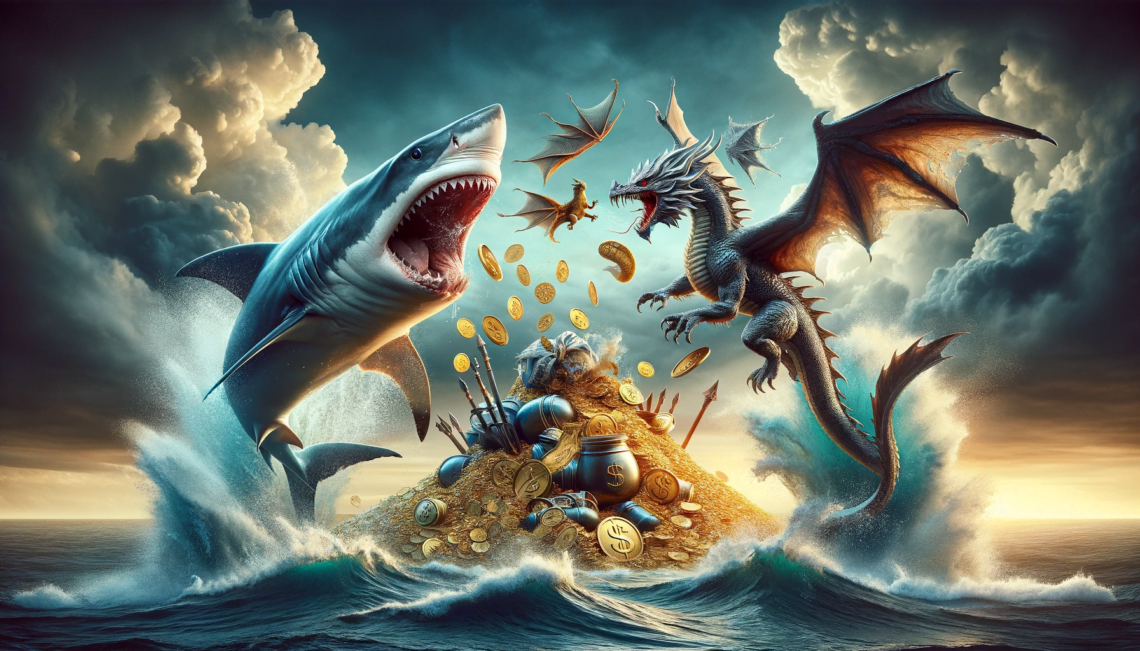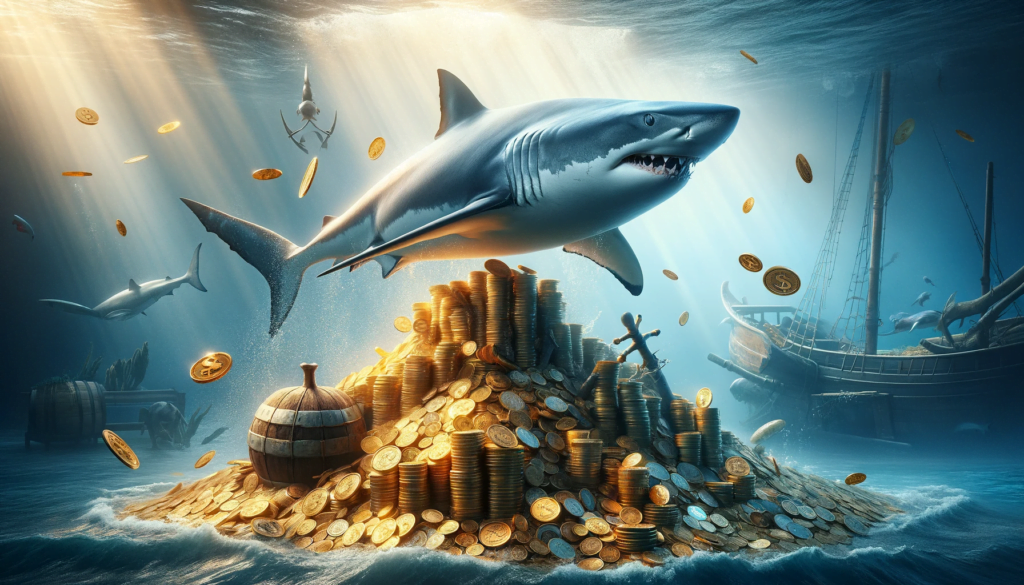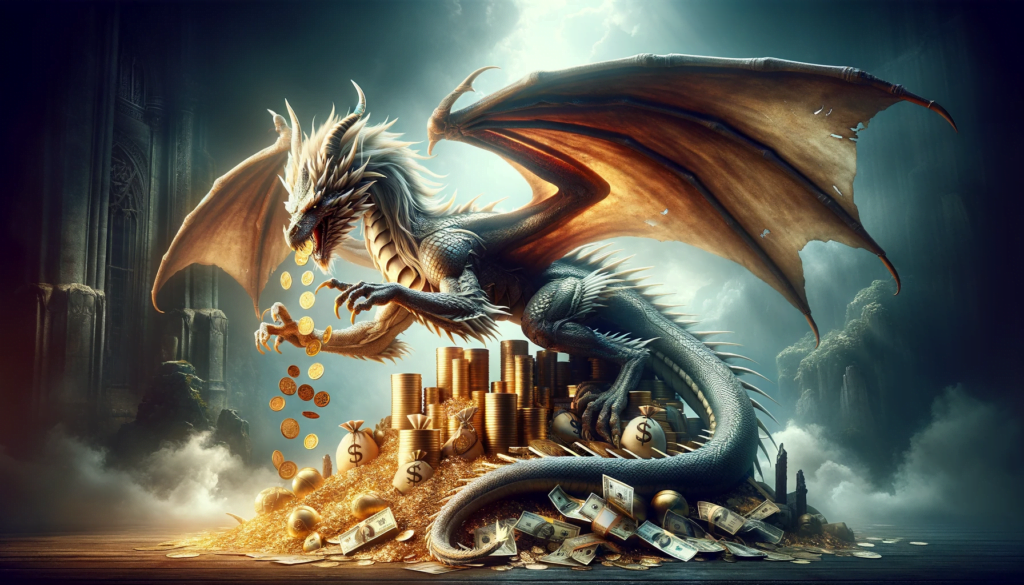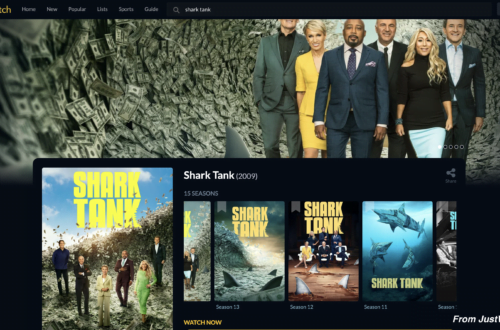
Shark Tank vs Dragons Den: What’s the Difference
In the competitive world of entrepreneurial TV shows, two giants stand apart – Shark Tank in the US and Dragons Den in the UK. Both are designed to give entrepreneurs the opportunity to find investments, mentorships, and partnerships with some of the world’s best businessmen and businesswomen. Yet, there are differences between Shark Tank and Dragons Den.
In our Shark Tank vs Dragons Den comparison, we look at differences in investors behavior, negotiation strategies, and the overall ethos that shapes each show’s distinctive character.
Table of Contents
If we were to simplify the Shark Tank and Dragons Den comparison, it would boil down to the metaphorical imagery of their names. The American ‘Shark Tank’ portrays a dynamic, cutthroat environment, a fast-paced business where investors circle like predatory sharks. Across the pond, the British ‘Dragons Den’ invokes an air of solemnity and wisdom, similar to that of a dragon guarding its treasure. These contrasting images reflect the unique styles of the panels who fight the fates of novice entrepreneurs.
Key Takeaways
- Shark Tank and Dragons Den originate from a Japanese show, yet, they have distinct cultural branding.
- Opposite representations – sharks imply aggression, dragons suggest wisdom.
- Entrepreneurs face different investor attitudes and challenges in each show.
- Both programs significantly influence the perception and meaning of entrepreneurship.
- Shark Tank embodies the American business landscape’s fast pace, whereas Dragons Den offers a more deliberate, British critique.
- Both shows promote innovation and entrepreneurship internationally.
Origins and Evolution of Competitive Business Shows
The inception and international success of business pitch TV shows goes back to Tigers of Money . This Japanese show was released in 2001 by Nippon Television and is considered the first of its kind where entrepreneurs pitch investors on TV. As these programs evolved, they tapped into different cultural contexts, solidifying the global popularity of entrepreneurial shows.
Roots in Japanese Television: The Tigers of Money
The legacy of contemporary entrepreneurial shows began in Japan with The Tigers of Money, a format that glued business-minded viewers to the TV screen. This innovative program laid the groundwork for its various international adaptations, and served as a template for a mix of show business and pioneer investments in groundbreaking ideas. Its roots are evident in the structures of this business show, which makes sense given the origins of Shark Tank and Dragon’s Den.
From Japanese Tigers to American Sharks and British Dragons
The transition from a Japanese show to the bastions of business pitches worldwide did not happen overnight. It took eight years for the show to become a reality in the US in 2009. Yet, it took only four more years before it reached the British shore, and launched its first episode of Dragons Den on January 4th 2005. This is not to be confused with the Canadian Dragons Den, that aired October 3, 2006. The British and Canadian shows are different shows, and this article will focus on the British one.
Nowadays the shows demonstrate how the everyday person has the opportunity to grow a multimillion dollar business thanks to ingenuity, hard work, and great partnerships.
Impact of Cultural Contexts on Show Development
Cultural nuances have played a pivotal role in shaping the personalities of these shows. While the American Shark Tank encompasses a more aggressive and high-stakes atmosphere, the British Dragon’s Den presents a comparatively introspective and contemplative approach to business pitches.
These cultural contexts are essential to understand how different brands have succeeded, pulling viewers into the thrilling world of entrepreneurship. These differences also create a heterogeneous landscape for viewers worldwide, contributing to the enduring global popularity of entrepreneurial shows.
Shows like Shark Tank and Dragon’s Den continue to entertain and inspire would-be entrepreneurs around the globe. The creators, investors, and competitors had a massive impact on the world of business and broadcast entertainment, paving the way for future adaptations in this thrilling competitive space.
Terminology: Shark Tank vs Dragons Den Explained
Symbolism carries a weight that transcends branding. It speaks to the underlying core of the show, to its structure, and to and the perceptions of business worldwide.
Shark Tank’s aggressive approach and Dragons’ Den cultural imagery are not merely creative decisions; they are emblematic of the shows’ more profound meaning. Let’s unpack the symbolism at the heart of the American and British battleground, and see how they shape our understanding of investments, investors and the path to business success.
The Sharks: Business Predators in the Tank

The majestic oceanic predator, the shark, is often viewed as a sign of raw power and fearlessness. Shark Tank capitalizes on this potent symbolism to reflect the high-energy and ruthlessly competitive spirit of American entrepreneurship. This image resonates with the audience’s expectation of enterprising ventures where negotiations are fierce, and the environment is as challenging as the open waters – survival of the fittest in the truest sense.
The Dragons: Majestic and Powerful Business Creatures

In contrast, Dragons’ Den draws upon the grandeur of cultural lore, where dragons evoke a different kind of respect – one mixed with awe and fear. These creatures are considered sagacious, wise, and relentless, with the skills to tease apart hidden jewels from stones.
This analogy reflects the meticulous nature of business evaluation that is more aligned with British cultural narratives – a space where entrepreneurs present their precious treasures in the hope of gaining support from these venerable beings.
Both the imagery of sharks and dragons in their respective shows serve as metaphors for the investors’ traits. It’s a storytelling technique that engages viewers with symbolism and business pitches. Whether it is the shark’s aggressive hunting prowess or the dragon’s thoughtful dominion over its den, both figures are the essence of their habitats: boardroom battlegrounds where dreams are made and can be destroyed.
Difference Between Shark Tank vs Dragons Den: Key Show Dynamics
In the sphere of business reality TV, the differences between Shark Tank and Dragons Den become more evident when we focus on the shows’ key dynamics. Notably, the shows excel in their portrayal of entrepreneurial pitching, but the way they engage with the participants and audience showcases the cultural bridge between American enthusiasm and British prudence.
Dragons Den is characterized by a more measured and serious tone. Entrepreneurs often receive a thorough drill-down of their business models, reflecting the careful and considered approach typical in British investment circles. In contrast, Shark Tank presents investor panel dynamics that amplify the excitement of the pitch – a deliberate move aligning with the energetic, opportunity-driven ethos of the American business landscape.
| Aspect | Shark Tank (US) | Dragons’ Den (UK) |
|---|---|---|
| Origin | Adaptation of the Japanese show “Tigers of Money.” | Originated from Japan as “Manē no Tora” (Money Tigers). |
| Premiere Date | August 9, 2009 | January 4, 2005 |
| Broadcast Network | ABC | BBC |
| Setting | The show is set in Los Angeles, California. | The show is set in Manchester, England. |
| Investors’ Titles | Referred to as “Sharks.” | Referred to as “Dragons.” |
| Investment Approach | Sharks are known for being more aggressive in deal-making. | Dragons are perceived as more cautious and deliberative. |
| Cultural Tone | More entertainment-focused, with a dramatic flair. | More business-oriented and formal in presentation. |
| Episode Structure | Episodes are typically one hour long, with more emphasis on personal stories. | Episodes are longer, often focusing more on business details. |
| Success Stories | Known for several high-profile success stories like Scrub Daddy, Squatty Potty. | Known for successful investments like Levi Roots’ Reggae Reggae Sauce. |
As for the investors’ lineup, Shark Tank’s panel is frequently packed with high-profile TV personalities and celebrities. Names like Gwyneth Paltrow, Kevin Hart, or Ashton Kutcher are examples of celebrities that successfully ventured into entrepreneurship, now becoming guest Sharks. Dragons Den, on its end, hosted the athlete Gary Neville, but focuses mostly on seasoned business investors.
An interesting exception is Emma Grede, a fashion tycoon originally from London, who built an empire with the Kardashian’s. Emma appeared as guest investors in Shark Tank Season 14 and Season 15, and in Dragons Den Season 21.
The dynamics on Shark Tank and the mentorship approach on Dragons Den show different sides of entrepreneurial success across the pond, while still being 100% real-world applications.
Behind the Scenes: Comparing Entrepreneurial Pitches and Deals
Pitching on Dragons Den or Shark Tank is probably a life-changing moment for most entrepreneurs. The intense negotiations, alongside the different ways investors interact with participants, provide a rich tapestry for examining the success rates and outcomes of the deals.
Negotiation Styles and Interactions with Investors
The contrasting negotiation styles on Shark Tank vs Dragons Den can pinpoint cultural differences embedded in the art of deal-making.
- American-born Shark Tank encourages entrepreneurs to be succinct yet thorough within their presentation, favoring a more structured and time-efficient format for a pitch.
- Dragons Den offers a more informal space, mentoring entrepreneurs through their business models with British touch, and leaving ample room for extra dialogues and suggestions.
Success Metrics: A Look at Closed Deals
Success stories from Shark Tank and Dragons Den highlight the tangible outcomes of these adrenaline-charged pitch sessions.
Data shows that Shark Tank averages around $200,000 per investment, whereas figures tilt to roughly $70,000 on Dragons Den. Dragons Den also closes more deals, with about 50% of the entrepreneurs getting a investment, while Shark Tank has a lower average of 25-30% of successful pitches.
| Show | Average Investment | Notable Success | Investor Interaction Style |
|---|---|---|---|
| Shark Tank | $200,000 | Scrub Daddy, Squatty Potty | Aggressive, Time-Bound |
| Dragons Den | £50,000 (~$70,000) | Reggae Reggae Sauce, Trunki | Collaborative, Open-Ended |
Influence of Show Structure on Business Proposals
Shark Tank favors a fastball approach, rewarding those who can deliver their pitch efficiently and withstand rapid-fire interrogation. On the other side, Dragons Den embraces the journey, slowing down to focus on the business plan, feasibility, and growth. This means that the same entrepreneur may need different pitches should he, or she, look for investment in both shows.
The perfect pitch during Shark Tank vs Dragons Den becomes a blend of art and science, and as demonstrated in both shows, that combination can be very successful for investment and growth.
Investor Panels and Their Influence on Business Development
Both Shark Tank and Dragons Den have an outstanding panel of investors. They are successful tycoons in their respective niche, or niches, that are able to see through the weeds of newbie entrepreneurs and shed light on what needs to be done.
This is also the reason Shark Tank and Dragons Den are two extremely successful shows. Reflecting the caliber of advice and financial input in these satellite boardrooms, the investor panels are pivotal in nurturing start-ups to industry leaders. Investment decisions on both shows have been known to embrace market trends, and—most importantly—the trajectory of many up-and-coming companies.
Net Worth: Dragons vs Sharks
The combined net worth of the investor panels is intimidating and summing up to a cumulative $7.5 billions for Shark Tank, and $1.977 billion for Dragons Den (as of January 2024). Shark Tank also has a longstanding cast, while Dragons Den has rotated most of its main investors over the course of the seasons.
The total net worth of the Sharks is mostly driven by Mark Cuban’s massive net worth of $6.2 billions. The cumulative net worth of the Dragons is instead made of more heterogeneous splits. Yet, Peter Jones takes the pole position with a net worth of $1.15 billions.
Below is a comparative tabulation of key investor attributes from both shows:
| Cast Member | Net Worth (USD) | Net Worth (GBP) |
|---|---|---|
| Mark Cuban | $6.2 billion | £4.9 billion |
| Kevin O’Leary | $400 million | £320 million |
| Daymond John | $350 million | £270 million |
| Barbara Corcoran | $100 million | £80 million |
| Lori Greiner | $150 million | £120 million |
| Robert Herjavec | $300 million | £240 million |
| Cast Member | Net Worth (USD) | Net Worth (GBP) |
|---|---|---|
| Peter Jones | $1.157 billion | £920 million |
| Deborah Meaden | $60 million | £48 million |
| Duncan Bannatyne | $100 million | £80 million |
| Theo Paphitis | $300 million | £240 million |
| Sarah Willingham | $10 million | £8 million |
| Touker Suleyman | $200 million | £160 million |
| Tej Lalvani | $100 million | £80 million |
| Jenny Campbell | $50 million | £40 million |
The differences in net worth on Shark Tank vs Dragons Den do not play a role in business decisions, rather, they represent a powerful injection of capital, mentorship, and market exposure for entrepreneurs that meet the bar.
Shark Tank and Dragons Den Comparison: Entertainment Value and Audience Engagement
The entertainment value of Shark Tank vs Dragons Den is undeniably a compelling aspect of why millions tune in season after season. The genius behind both shows lies not only in the opportunity they present to rising entrepreneurs but also in their masterful storytelling and production that keeps the audience at the edge of their seats. The audience engagement in business shows like these relies on the investors ability to blend informative content with TV drama.
Active discussions on social media platforms, along with various online spin-offs, keep the audience engaged well beyond the television screen. The shows’ unique flavors of confrontation and counsel encourage fans to stay connected through community discussions and debates over pitches, valuations, and investment outcomes.
Interestingly, Shark Tank was the first to have a live show on Season 15 Episode 1, while Dragons Den never had a live audience.
While, the approach to audience engagement may differ, the outcome is the same. That is a robust and loyal fan base, discussing every deal, every entrepreneur, and every dragon or shark they either love or hate.
The table below simplifies audience engagement in Shark Tank vs Dragons Den:
| Element | Shark Tank | Dragons Den |
|---|---|---|
| Tone | High-energy, Reality TV Style | Serious, Business-Focused |
| Audience Engagement | Interactive Social Media Presence, Memes, Online Spin-offs | Business Discussions, Methodical Assessment of Pitches |
| Investment Drama | Rapid-Fire Negotiations, High-Stakes Deals | Detailed Pitch Analysis, More Subdued Confrontations |
| Entertainment Strategy | Personality-Driven, Quick-Witted | Contemplative, Nuanced Storytelling |
To be honest, there is no much difference in Shark Tank vs Dragons Den since both marry the intensity of entrepreneurship with the storytelling and drama that only TV can show. This unique blend educates and also glue viewers to the screen, with a realm of business and investments that entertains and inspires.
Conclusion
Cultural and entrepreneurial nuances in business pitches are behind some of the main differences between Shark Tank and Dragons Den. Yet, while on opposite sides of the Atlantic ocean, both Shark Tank and Dragons Den TV shows excite the pulsing heart of young and old entrepreneurs.
They present a compelling dichotomy – the bold, high-octane pitches of Shark Tank and the strategic, thoughtful probing typical on Dragons Den. Each cast is a unique blend of experience and enterteimnet, so that when looking at Shark Tank vs Dragons Den, you can see charismatic investors and determined entrepreneurs collide, in pursuit of a win-win deal.
Final Verdict: Who Wins the Investment Battle?
The fight between Sharks and Dragons is probably better suited for a video game. In the real-world, entrepreneurs make and lose money, they can be happy campers, or lose their house, they can jump full of joy or shed into tears because they don’t have any other way out.
Both shows changed lives. Both shows made millionaires. Both shows sent home entrepreneurs that didn’t have what it takes to win a deal. Both shows inspired thousands, if not millions, of everyday Joe to become master of their time and fate. Both shows have created dreams. Both shows have shattered dreams. Both shows created legacies. Both shows broke spirits.
I don’t think there is a single winner between Shark Tank vs Dragons Den. I believe that the real winners are the entrepreneurs that enter that arena. They win thanks to the courage of showing up, and taking a risk. Overall, the entrepreneurial spirit is what prevails, regardless of what side of the Ocean you live in.
FAQ
What is the difference between Shark Tank vs Dragons Den?
Shark Tank vs Dragons Den, they are both competitive business shows where entrepreneurs pitch their ideas to a panel of investors. The key differences lie in their approach, negotiation styles, and cultural connotations. Shark Tank, based in the US, projects a more aggressive and high-energy atmosphere, with investor interactions often described as direct and confrontational. Dragons Den, originating from the UK, typically features a more serious and contemplative environment with investors known for their thorough questioning and advice.
What are the origins of Shark Tank and Dragons Den?
Both Shark Tank and Dragons Den have their roots in the Japanese show “The Tigers of Money.” They are tailored versions of the Japanese format adapted to cater to American and British audiences, respectively. These adaptations reflect the respective cultures and business practices of the countries in which they air.
How do cultural contexts impact Shark Tank and Dragons Den’s development?
Cultural contexts have significantly shaped the development of Shark Tank vs Dragons Den. Shark Tank mirrors the American entrepreneurial spirit, valuing aggressive, quick decision-making and a showy presentation style. In contrast, Dragons Den often reflects a more reserved British business culture that values detailed analysis and a more refined approach to investment.
What does the terminology of “sharks” and “dragons” signify in the respective shows?
In Shark Tank, “sharks” represent the investors’ aggressive and predatory nature in affairs, suggesting their readiness to seize opportunities and dominate the competition. The term “dragons” in Dragons Den implies wisdom, power, and the significant financial resources that investors, like mythical dragons guarding treasures, are willing to invest for worthy business ventures.
How do negotiation styles and investor interactions differ in Shark Tank and Dragons Den?
The negotiation styles on Shark Tank are typically more confrontational, with entrepreneurs expected to stand their ground in rapid-fire, high-pressure scenarios. Dragons Den provides a somewhat quieter setting that allows for more detailed discussions and assessments, often with investors guiding entrepreneurs through their business models and questioning their proposals more thoroughly.
What are the success metrics for deals made on Shark Tank vs Dragons Den?
Success metrics include the amount of investment secured, the percentage of equity given up, and the outcomes after the show airs such as growth in sales, business scalability, and long-term viability. Both shows have seen deals where entrepreneurs have turned small businesses into multi-million dollar enterprises, though the investment amounts and terms can differ considerably between the two shows.
Who are the investors on the panels of Shark Tank and Dragons Den?
Shark Tank features a diverse group of successful entrepreneurs and business executives like Mark Cuban, Lori Greiner, and Kevin O’Leary, who bring celebrity status along with their business acumen to the show. Dragons Den has featured a range of respected UK-based entrepreneurs such as Deborah Meaden, Peter Jones, and Theo Paphitis, who provide expertise and substantial financial backing to aspiring entrepreneurs.
How do Shark Tank and Dragons Den engage with their audience beyond the show?
Both Shark Tank vs Dragons Den extend their engagement through various online platforms, including social media, where they share updates, behind-the-scenes content, and success stories. Their active online presence creates communities of fans and aspiring entrepreneurs, fostering a broader interest in entrepreneurship and innovation.
Which show is better for entrepreneurs, Shark Tank or Dragons Den!
The better show for a particular entrepreneur depends on their specific needs, the nature of their business, their preferred negotiation style, and where they are based. Shark Tank may offer greater exposure to a larger American market and higher investment potential, while Dragons Den may be the perfect platform for those who seek a more methodical, advice-oriented investment approach in the UK.
How have Shark Tank and Dragons Den contributed to the entrepreneurial ecosystem?
Both shows have significantly influenced the entrepreneurial ecosystem by showcasing real-world business negotiations, funding innovative ideas, and inspiring viewers to pursue entrepreneurship. They provide a platform for product exposure, capital infusion, and mentorship opportunities that can propel businesses forward, contributing to economic growth and innovation.
Did Shark Tank copy Dragons Den?
Shark Tank did not copy Dragons’ Den but rather is an adaptation of the same concept. Both shows are based on the original Japanese TV show, “Tigers of Money,” which first aired in 2001
Source Links







